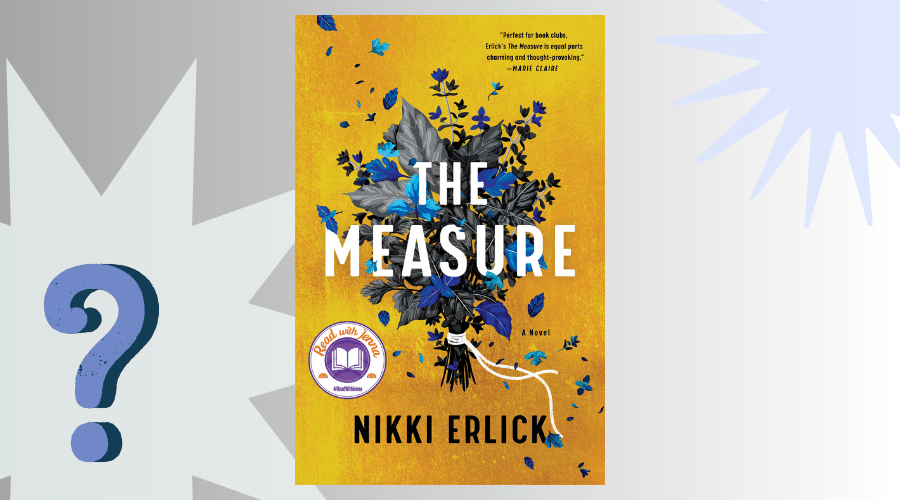The Measure is an excellent pick for a book club! Its intriguing premise—what if you knew exactly how long you had to live?—opens the door to rich discussions on life, destiny, and how knowledge shapes our choices. The story follows diverse, relatable characters whose lives intertwine, making it easy for readers to connect with different perspectives and spark debates about who made the right decisions and why.
The book dives into ethical dilemmas around privilege, inequality, and how society might treat people based on their “strings,” offering plenty of food for thought. Its themes of love, friendship, and what truly matters in life resonate universally, ensuring everyone in the group finds something to reflect on.
What makes it especially great for a book club is its accessibility. The writing is engaging and easy to follow, appealing to both casual and seasoned readers. The story flows well, so even busy members can enjoy it without feeling overwhelmed. Plus, the “what if?” scenario practically begs for personal reflection—what would you do if you received a box? Would you open it, and how would it change your life?
20 The Measure Book Club Questions
Here’s a list of 20 engaging book club questions for The Measure by Nikki Erlick. These will help spark thoughtful discussions and debates in your group:
- What were your initial thoughts about the premise? Did you find it believable or too far-fetched?
- How did you feel about the idea of the strings? Would you open your box or not? Why?
- Did the book’s tone—hopeful, somber, or something else—align with your expectations? Why or why not?
- Which character did you relate to the most? Why?
- Were there any characters you disliked or disagreed with? What made you feel that way?
- How did you feel about Nina and Maura’s decisions? Were they justified in their choices?
- How did the introduction of Anthony’s story influence your understanding of destiny and personal choice?
- What does the string symbolize to you? Is it purely about time, or does it represent something deeper?
- Did the book make you reflect on how you approach life and time? How so?
- How did the book portray the intersection of fate and free will? Do you believe in one more than the other?
- What did you think about how society responded to the strings? Did it feel realistic?
- Were you surprised by how the government and institutions reacted to the strings? Why or why not?
- How did the strings reinforce or challenge societal inequalities, such as privilege and discrimination?
- Would you want to live in a world with or without the strings? Why?
- How did the strings influence the way characters approached love and relationships?
- Did the ending feel satisfying in terms of the characters’ personal growth and relationships? Why or why not?
- What lessons about love, family, or friendship stood out to you from the book?
- If you were part of the book’s world, how do you think your community or country would react to the strings?
- What would you do differently in your life if you knew how much time you had left?
- How might the story have been different if no one ever opened their box? Would it have changed the impact of the story for you?
These questions should make for a lively and thought-provoking book club meeting!
The Measure: Discussion Topics
Here are some great discussion topics for The Measure by Nikki Erlick that will encourage a deeper exploration of its themes and story:
The Strings and Mortality
The Measure offers a wealth of discussion topics that delve into its thought-provoking themes and compelling narrative. One of the central questions revolves around the concept of the strings and how they impact perceptions of mortality and life choices. Do the strings represent control over the unknown, or do they amplify the fear of inevitability? Readers can explore whether they’d open their own box and discuss how this choice reflects human curiosity and the desire to manage fate. The implications of this concept on societal behavior—would people adapt or collapse under the pressure—are also ripe for discussion.
Free Will vs. Fate
The book’s exploration of free will versus fate is another compelling theme. Each character’s decision to open or not open their box reveals their personality, values, and resilience. How does knowing your lifespan influence your approach to life, and does it enhance or diminish joy? The tension between living freely and being constrained by knowledge of one’s mortality can lead to a rich debate on whether the story favors fate or the power of choice.
Relationships and Love
Relationships and love are deeply affected by the strings, adding emotional depth to the story. From Nina and Maura’s evolving dynamic to Amie’s struggles with love and time, the book examines how people adapt their relationships in light of their “strings.” This raises questions about how shared time, or the lack thereof, affects human connections. Readers might reflect on how they’d approach love, family, and friendships differently with the knowledge of a finite lifespan.
Social and Ethical Dilemmas
The strings also highlight social and ethical dilemmas. They expose and, in some cases, reinforce societal divides, such as privilege, discrimination, and access to opportunities. Discussions can delve into whether society should accommodate “short-stringers” and what this might look like in practice. The realism of governmental, corporate, and media responses to the strings can spark debates on how such an event would play out in the real world.
Balancing Hope and Despair
Finally, The Measure balances themes of hope and despair, prompting reflection on how the characters navigate their lives under the weight of knowledge. Which moments in the book inspired hope despite its heavy themes? The characters’ responses to their situations, such as Maura’s decision about her box or Anthony’s moral struggles, invite readers to evaluate their choices and consider what they’d do differently. The strings, beyond representing lifespan, become a symbol of control, destiny, and identity, challenging readers to rethink how they approach life itself.
The Measure Book Club Food Ideas
For a The Measure book club gathering, here are some themed food and drink ideas that align with the book’s themes of time, fate, and the choices we make:
Themed Food
- Clock-shaped cookies or cupcakes: Decorate cookies or cupcakes with clock faces or numbers to represent the passage of time.
- Countdown popcorn mix: A colorful popcorn mix with different candies or dried fruit to symbolize the stages of life.
- String cheese or cheese platters: Serve string cheese as a fun nod to the string that measures life in the book.
- Spaghetti or noodle dishes: Represent the concept of life’s threads with a pasta dish like spaghetti, noodles, or ramen.
Themed Drinks
- Time-Teller cocktails/mocktails: Create drinks with names like “The Last Sip” or “Moment of Clarity,” or make layered drinks symbolizing different stages of life.
- Tea or coffee bar: A cozy option for deep discussions, offering a selection of teas and coffees for guests to brew their own.

